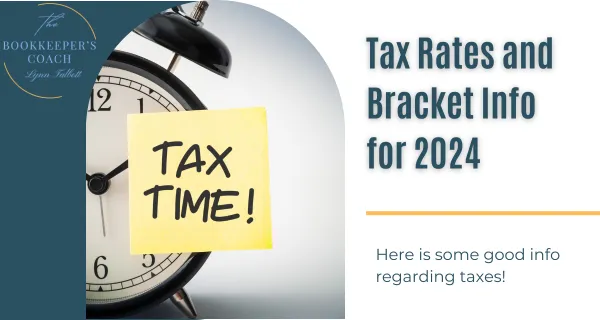The Bookkeeper's Blog
Home to some of the best knowledge nuggets savvy bookkeeping entrepreneurs need to know. Learn what you need to know about growing a successful firm, building a team of ahh-mazing bookkeepers, and more.

Important Tax Info 2024
Here is some helpful information for tax season. Even though we don't do the taxes, preparing for them is real! I hope this helps you be "in the know"!
What are the rates and brackets for tax year 2024?

What is the standard deduction for 2024?
For 2024, the standard deduction has increased to adjust for inflation.

Note: If you are 65 or older or blind, your standard deduction is higher. For 2024, the additional standard deduction amounts are:
Single or head of household: Additional $1,950 per qualifying condition.
Married filing jointly, married filing separately, or qualifying surviving spouse: Additional $1,550 per qualifying condition.

Standard Mileage Rates for 2024
The IRS has set the following standard mileage rates for the 2024 tax year:
Business use: 67 cents per mile (up 1.5 cents from 2023).
Medical or moving purposes: 21 cents per mile (down 1 cent from 2023).
Charitable organizations: 14 cents per mile (unchanged from 2023).
These rates apply to all vehicle types, including electric, hybrid-electric, gasoline, and diesel-powered vehicles. Taxpayers also have the option to calculate actual vehicle expenses instead of using the standard mileage rates.

Retirement Plan Contribution Limits for 2024
The IRS has increased contribution limits for various retirement accounts in 2024:
401(k), 403(b), and 457 plans: The elective deferral limit is now $23,000, with an additional $7,500 catch-up contribution for individuals aged 50 and older, allowing a total contribution of up to $30,500.
SIMPLE IRAs: The contribution limit is $16,000, with a $3,500 catch-up contribution for those 50 and older, totaling up to $19,500.
Traditional and Roth IRAs: The annual contribution limit has increased to $7,000, with a $1,000 catch-up contribution for individuals aged 50 and older, bringing the total to $8,000.
Changes to Payment Platforms Like PayPal and Venmo
The IRS has updated reporting thresholds for third-party payment platforms such as PayPal and Venmo:
In 2024, individuals receiving over $5,000 in payments for goods and services will receive a Form 1099-K in early 2025.
The threshold will drop to $2,500 in 2025 and further decrease to $600 in 2026 and beyond.
Personal transactions, such as payments between friends and family for gifts or shared expenses, are not subject to 1099-K reporting. However, all taxable income must still be reported, regardless of whether a Form 1099-K is received. Additionally, some states have lower reporting thresholds, which may result in receiving a Form 1099-K even if federal limits aren’t met.
Staying informed about these updates can help you better serve your clients as you're preparing their books for tax filing!

free guide & workbook
Vision to Victory:
Goal-Setting for Bookkeepers
Discover the goal-setting framework that helped me build and sell a million-dollar bookkeeping firm.
Don't let another year pass you by – it's time to turn your vision into victory.

© 2025, The Bookkeeper's Coach, llc

LinkedIn
Youtube
Facebook
Instagram